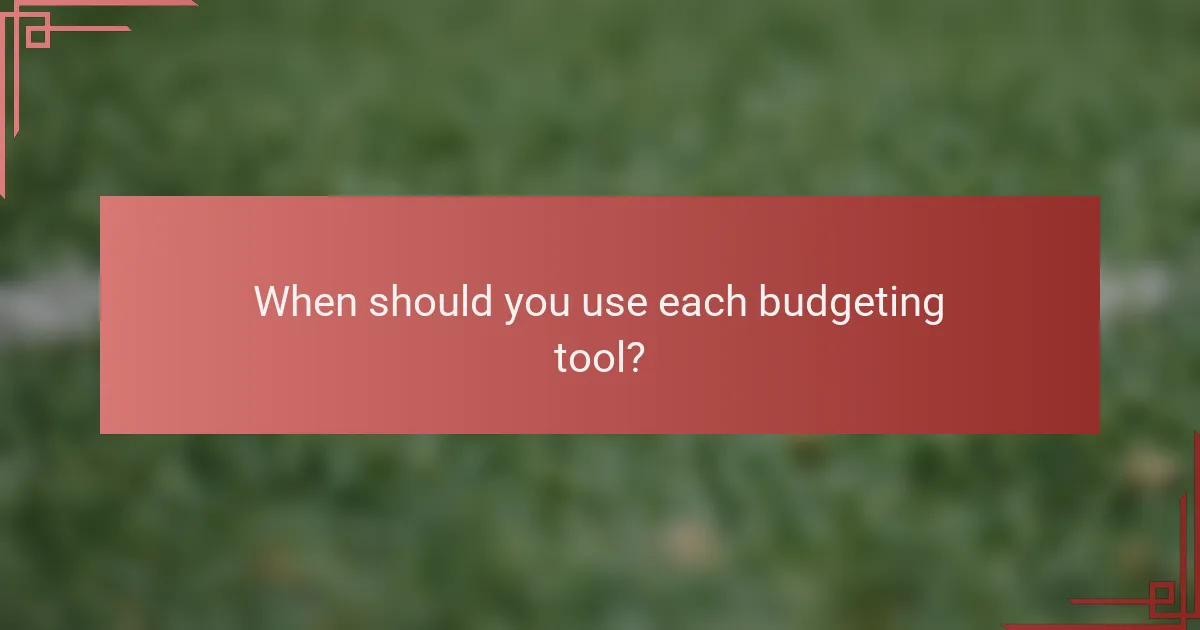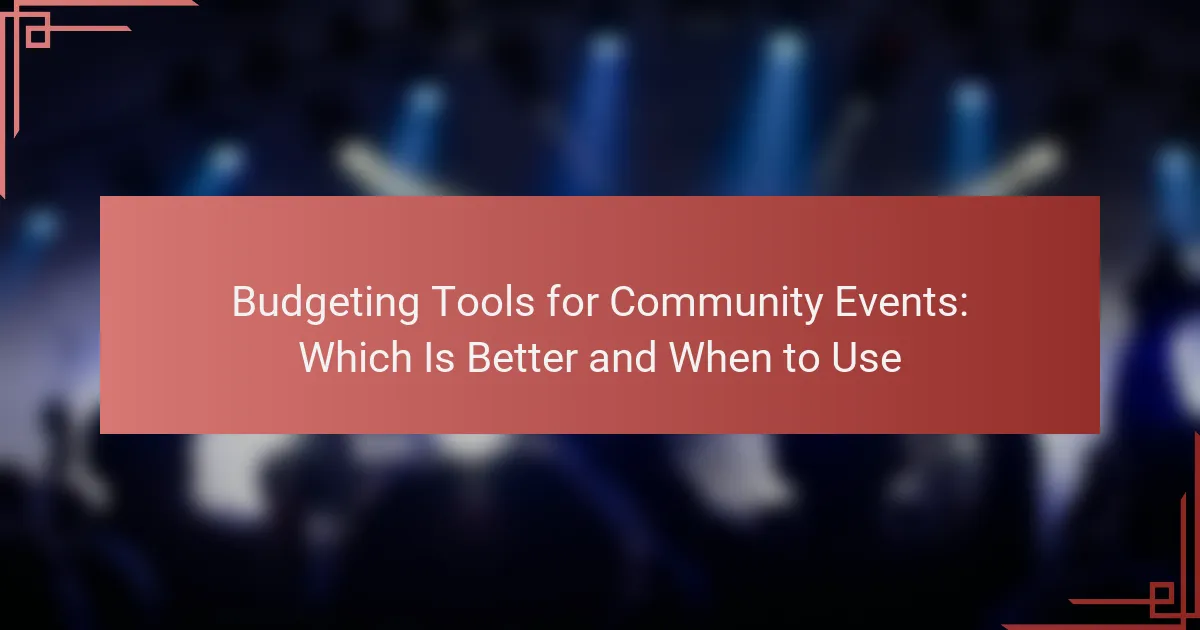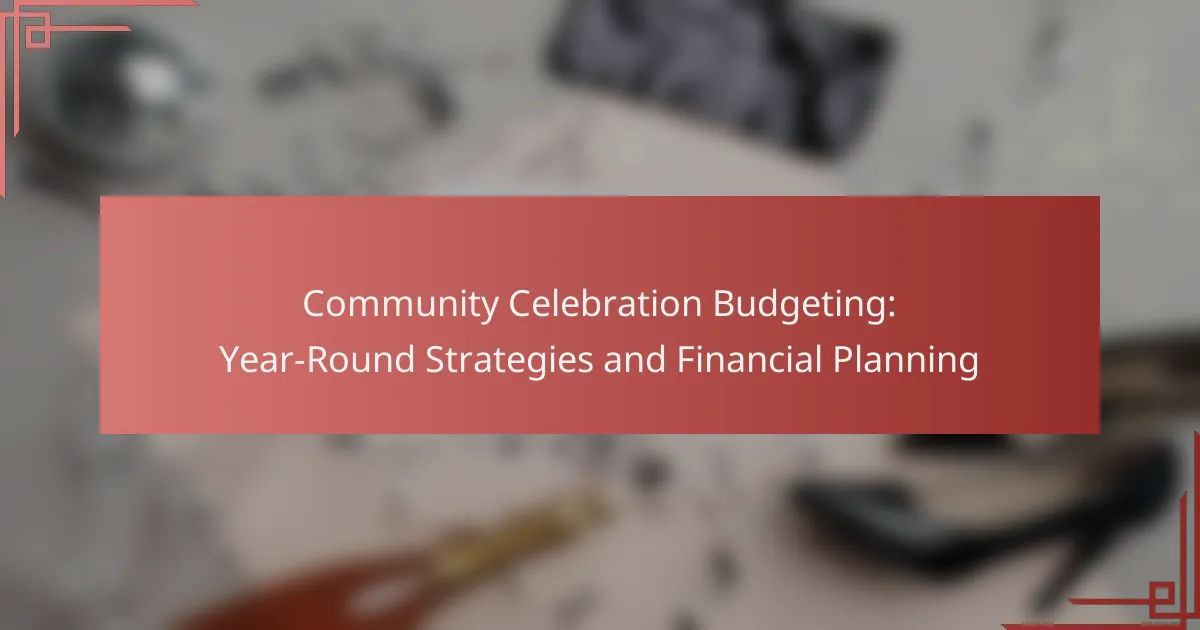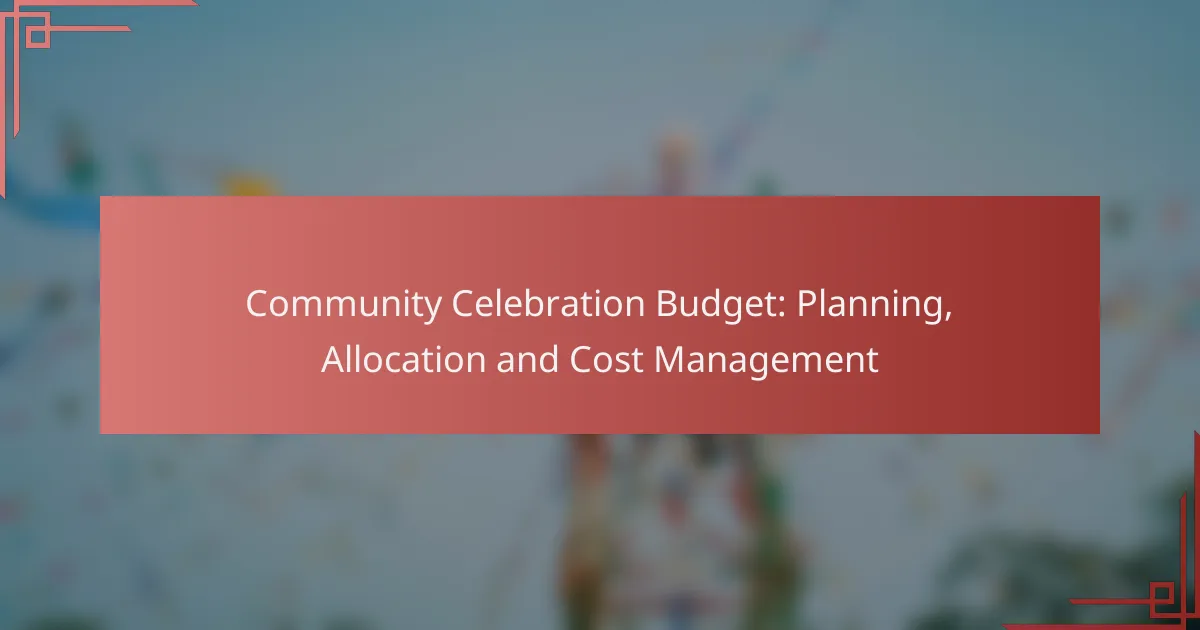When planning community events, selecting the right budgeting tool is crucial for effective financial management. Various tools are designed to meet different needs based on the event’s scale and complexity, offering features that enhance cost tracking, collaboration, and reporting. Understanding the unique strengths of each tool will help streamline the budgeting process and ensure a successful event.

Which budgeting tools are best for community events in the US?
Several budgeting tools cater specifically to community events in the US, each offering unique features. The best choice depends on the event’s scale, complexity, and specific budgeting needs.
Eventbrite Budgeting Tool
Eventbrite provides a built-in budgeting tool that simplifies financial planning for events. It allows users to track ticket sales, expenses, and revenue in real-time, making it easier to manage cash flow.
Consider using Eventbrite if your event relies heavily on ticket sales. It integrates seamlessly with event registration, allowing for efficient financial oversight without needing separate software.
Asana for Event Planning
Asana is primarily a project management tool, but it can be adapted for budgeting community events. Users can create tasks for each budget item and assign costs, deadlines, and responsible parties.
This tool is ideal for collaborative events where multiple team members are involved. It helps keep everyone accountable and ensures that all budget-related tasks are tracked effectively.
Google Sheets for Custom Budgets
Google Sheets offers a flexible platform for creating custom budgets tailored to your event’s specific needs. Users can build their budget templates, allowing for detailed tracking of income and expenses.
This option is great for those who prefer a hands-on approach. With features like formulas and charts, you can easily visualize your budget and make adjustments as needed. Just ensure you regularly update the sheet to maintain accuracy.
QuickBooks for Nonprofits
QuickBooks is a robust accounting software that can be particularly beneficial for nonprofit organizations managing community events. It provides comprehensive financial reporting, expense tracking, and invoicing capabilities.
Nonprofits should consider QuickBooks if they require detailed financial oversight and reporting for grant applications or donor transparency. It may have a steeper learning curve, but the investment can pay off in better financial management.
Mint for Personal Event Budgets
Mint is a personal finance app that can be useful for individuals planning small community events. It allows users to set budgets, track expenses, and receive alerts when nearing budget limits.
This tool is best for personal events or smaller gatherings where detailed financial tracking is necessary. Mint’s user-friendly interface makes it easy to manage finances without overwhelming complexity.

When should you use each budgeting tool?
Choosing the right budgeting tool for community events depends on the event type and specific needs. Each tool has unique strengths that cater to different aspects of event planning, from ticket sales to team collaboration and financial tracking.
Eventbrite for ticketed events
Eventbrite is ideal for managing ticketed events, as it streamlines the ticketing process and provides built-in promotional tools. It allows organizers to set ticket prices, manage sales, and track attendance effortlessly. If your event involves charging attendees, Eventbrite can simplify the financial aspect significantly.
Consider using Eventbrite if you expect a large audience and want to leverage its marketing features. The platform also integrates with social media, helping to boost visibility and sales.
Asana for team collaboration
Asana excels in facilitating team collaboration for event planning. It allows teams to assign tasks, set deadlines, and track progress in a visual format. This tool is particularly useful when multiple people are involved in organizing different aspects of an event.
Use Asana when you need to coordinate efforts among various stakeholders. Its project management features help ensure that everyone is on the same page, reducing the chances of miscommunication or missed deadlines.
Google Sheets for flexibility
Google Sheets offers unparalleled flexibility for budgeting, allowing users to customize their spreadsheets to fit specific needs. This tool is suitable for those who prefer a hands-on approach to budgeting, as it enables real-time collaboration and easy sharing with team members.
Consider Google Sheets if you need to track various budget categories or make adjustments on the fly. Its versatility makes it a great choice for smaller events or for those who want to maintain control over their financial data.
QuickBooks for detailed financial tracking
QuickBooks is designed for comprehensive financial management, making it ideal for events with complex budgets. It provides detailed reporting features that help track income, expenses, and overall financial health. This tool is particularly beneficial for larger events or organizations that require precise financial oversight.
Use QuickBooks if you need to manage multiple revenue streams or if your event involves significant expenditures. Its accounting capabilities can help ensure compliance with financial regulations and provide insights for future events.
Mint for personal finance integration
Mint is a personal finance tool that can be useful for individuals organizing community events on a smaller scale. It helps users track their personal budgets and expenses, making it easier to allocate funds for event-related costs. Mint is particularly beneficial for those who are funding events out of pocket.
Consider using Mint if you want to keep your personal finances and event budgeting in sync. This tool can help you identify spending patterns and ensure that your event stays within your overall budget constraints.

What features should you look for in budgeting tools?
When selecting budgeting tools for community events, prioritize features that enhance cost management, collaboration, and reporting. The right tool will streamline the budgeting process, making it easier to track expenses and engage team members effectively.
Cost tracking capabilities
Cost tracking is essential for managing event budgets effectively. Look for tools that allow you to input estimated and actual expenses, categorize costs, and set budget limits. Features like alerts for overspending can help you stay within financial constraints.
Consider tools that provide real-time updates on spending, enabling you to adjust plans as necessary. A good budgeting tool should also allow you to visualize costs through charts or graphs, making it easier to communicate financial status to stakeholders.
Collaboration features
Collaboration features are vital for ensuring that all team members can contribute to the budgeting process. Choose tools that allow multiple users to access and edit the budget simultaneously, facilitating teamwork and accountability.
Look for options that include comment sections or chat functionalities, enabling discussions about specific budget items. This can enhance communication and help resolve discrepancies quickly, keeping everyone aligned on financial goals.
Reporting and analytics
Robust reporting and analytics capabilities are crucial for evaluating the financial success of your event. Select tools that offer customizable reports, allowing you to analyze spending patterns and identify areas for improvement.
Consider tools that provide insights into budget variances and forecasts for future events. This data can help you make informed decisions and optimize budgeting strategies for subsequent community activities.
Integration with other software
Integration with other software can significantly enhance the functionality of your budgeting tool. Look for options that connect seamlessly with accounting software, project management tools, or event planning platforms to streamline workflows.
Tools that offer API access or built-in integrations can save time and reduce errors by automating data transfers. This ensures that all financial information is consistent across platforms, making it easier to manage your event budget.
User-friendly interface
A user-friendly interface is essential for ensuring that all team members can navigate the budgeting tool with ease. Choose tools that feature intuitive designs, clear navigation, and helpful tutorials or support resources.
Consider the learning curve associated with each tool. A straightforward interface can reduce training time and help your team focus on budgeting rather than troubleshooting software issues. Look for tools that offer mobile access for on-the-go budget management as well.

How do budgeting tools impact community event success?
Budgeting tools significantly enhance the success of community events by providing clear financial oversight, improving planning efficiency, and ensuring better resource allocation. These tools help organizers manage funds effectively, track expenses, and make informed decisions that contribute to a successful event.
Improved financial oversight
Effective financial oversight is crucial for community events, as it allows organizers to monitor income and expenses in real-time. Budgeting tools provide dashboards that display financial data clearly, helping to identify potential overspending or shortfalls early in the planning process.
For instance, using a budgeting tool can help track ticket sales against venue costs, ensuring that the event remains profitable. Regularly reviewing this data can prevent financial surprises and keep the event within budget.
Enhanced planning efficiency
Budgeting tools streamline the planning process by automating calculations and providing templates for common expenses. This efficiency allows organizers to focus more on creative aspects of the event rather than getting bogged down in financial details.
For example, a budgeting tool can automatically update totals when expenses change, saving time and reducing errors. This feature is particularly useful when dealing with multiple vendors or fluctuating costs, as it keeps the budget current without manual recalculations.
Better resource allocation
Better resource allocation is achieved through the insights provided by budgeting tools, which help prioritize spending based on event goals. By analyzing where funds are most needed, organizers can allocate resources more effectively to maximize impact.
For instance, if a tool indicates that marketing costs are yielding high ticket sales, organizers might choose to invest more in that area. Conversely, if catering expenses exceed expectations without corresponding benefits, adjustments can be made to ensure funds are directed toward more effective areas.


